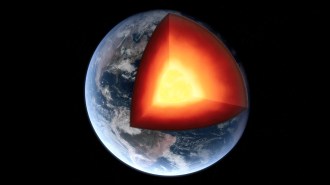On Monday in Bonn, negotiators from 178 nations reached an accord that should help transform the 1997 Kyoto Protocol on global warming into a binding international treaty.
They did it without the United States. Last month, President Bush repeatedly warned that his administration would not back the Kyoto Protocol (SN: 12/20 & 27/97, p. 388) because it is, he said, “fatally flawed in fundamental ways.” U.S. representatives in Bonn behaved accordingly, says Ute Collier, an observer in Bonn representing the World Wildlife Fund-UK in London.
Mostly, she told Science News, U.S. negotiators “sat back and didn’t say anything.”
For other negotiators, the two most contentious issues centered on how much each nation’s carbon emissions must be cut. Developed nations lobbied for smaller cutbacks in recognition of their big carbon sinks–such as forests that sop up carbon –or pledges to invest in technologies for cutting carbon dioxide (CO2 ) in other countries. Leaving the details for later talks, the negotiators agreed to include emissions credits for both of these conditions.
The last major sticking point was whether CO2 cutbacks under the treaty should be legally binding. The participants concluded they should.
Now, a country that misses its cutback target during the initial phase of the treaty would have its required cutback increased by 0.3 percent during the next implementation phase.
In November, the negotiators will resume deliberations in Morocco.







